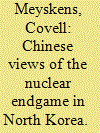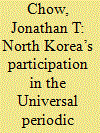|
|
|
Sort Order |
|
|
|
Items / Page
|
|
|
|
|
|
|
| Srl | Item |
| 1 |
ID:
183214


|
|
|
|
|
| Summary/Abstract |
The Democratic People’s Republic of Korea (DPRK)’s only confirmed uranium mill is within the Pyongsan uranium mining complex. The ore processing pathway and the production capacity for uranium concentrate is analyzed, based on comprehensive satellite imagery analysis of this facility. This assessment of the Pyongsan facility indicates an ore processing capacity of ∼750–1,200 tonnes per day. One year of maximum production at Pyongsan would yield enough processed ore to fuel one load of the 5 MWe reactor in Yongbyon as well as ∼3,000 kg of LEU or ∼100 kg of HEU. The analysis suggests that the ore processing capacity at Pyongsan is not a constraint on the DPRK’s nuclear material production and that the available capacity at the Pyongsan milling facility strongly suggests that the DPRK has no need in another uranium milling facility of a comparable size. This report provides an improved understanding of the ore processing steps and production rates of the only confirmed uranium mill in the DPRK, enabling a more quantitative assessment of its nuclear materials production and inventories.
|
|
|
|
|
|
|
|
|
|
|
|
|
|
|
|
| 2 |
ID:
171176


|
|
|
|
|
| Summary/Abstract |
This article examines Chinese views of North Korea’s nuclear-weapon program during the Donald J. Trump administration. It shows that China has portrayed itself as a responsible country that promotes regional stability, unlike the United States, which has engaged in military brinkmanship with North Korea. Some Chinese foreign-policy experts have asserted that Beijing should back Pyongyang in the event of war because of their shared history of humiliation by great powers, while others have favored working with other regional partners. Another theme in Chinese discourse about North Korea is that Pyongyang is an impetuous, ungrateful regime that impedes Beijing’s ability to attain its core interests of regional stability, economic development, and heightened global influence. This negative assessment of North Korea drove Beijing’s endorsement of stricter UN sanctions in 2017. While Beijing has punished Pyongyang for its wayward policies, China responded favorably to North Korea’s decision in April 2018 to stop nuclear tests and partake in international dialogue. Beijing seeks to help Pyongyang gradually disarm and develop its economy within a Chinese-led East Asian order. The article concludes by explaining how Beijing’s recent, more positive view of Pyongyang is likely to affect its support for American efforts to dismantle North Korea’s nuclear-weapon program.
|
|
|
|
|
|
|
|
|
|
|
|
|
|
|
|
| 3 |
ID:
136073


|
|
|
|
|
| Summary/Abstract |
The Democratic People's Republic of Korea (DPRK) justifies its nuclear weapon arsenal with the concept of deterrence. It means that it will try to miniaturize and modernize its warheads and missiles. This leads to a first-use doctrine of nuclear weapons. Obama's policy of engagement does not offer a solution to the North Korean nuclear issue as yet. In the context of its policy of critical engagement with the DPRK, the European Union has three key interests: regional peace and stability, denuclearization, and human rights. The Conference on Security and Cooperation (CSCE) could be a precedent. The CSCE process was based on three “baskets”: security, economics, and humanitarian. The multilateral Trans-Pacific Partnership is a step in this regard. This article looks at three theoretical approaches: realism, liberal institutionalism, and liberal internationalism. It concludes that a political strategy to create a stable North Korean peninsula has to go beyond nuclear deterrence that is based on the realist notion of balance of power.
|
|
|
|
|
|
|
|
|
|
|
|
|
|
|
|
| 4 |
ID:
151997


|
|
|
|
|
| Summary/Abstract |
North Korea’s participation in the UNHRC’s Universal Periodic Review (UPR)—a peer review in which states make recommendations to one another for improving human rights implementation—is a notable exception to its rejection of other human rights mechanisms. What explains North Korea’s willing participation in the UPR? This essay analyses North Korea’s participation in the first (2008–11) and second (2012–15) UPR cycles through its written submissions, responses to recommendations, and recommendations to other states. It finds that North Korea has consistently accepted weak recommendations, rejected more specific policy changes, and implemented accepted recommendations on a limited basis, allowing it to claim compliance with human rights at minimal cost. The UPR’s reliance on states’ self-reports and its inability to adjudicate competing factual claims allow North Korea to reject claims of egregious abuses, openly advocate for a radically state-centric vision of human rights, and challenge the legitimacy of human rights mechanisms like the Commission of Inquiry and Special Rapporteur while building support from other states with similar views. Notably, the Commission of Inquiry appears to have motivated North Korea to increase its cooperation with the UPR, demonstrating that the UPR complements but cannot replace other UN human rights mechanisms.
|
|
|
|
|
|
|
|
|
|
|
|
|
|
|
|
|
|
|
|
|